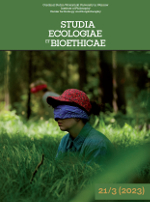Forest Pedagogy towards the Problem of Polish ducational Monoculture: Projective Pilot Studies
Forest Pedagogy towards the Problem of Polish ducational Monoculture: Projective Pilot Studies
Author(s): Michał PaluchSubject(s): Education, Environmental Geography, Human Ecology
Published by: Wydawnictwo Naukowe Uniwersytetu Kardynała Stefana Wyszyńskiego w Warszawie
Keywords: Forest pedagogy;playground;non-playground;forest kindergartens;educational monoculture;forest monoculture;idea of sustainable development
Summary/Abstract: The development of topics related to the idea of sustainable development, ecology and the climate crisis is increasingly supported by Polish educators, psychologists and therapists. At the same time, forest kindergartens as well as various grassroots initiatives based on the methodology of outdoor education are developing in Poland. The long-term achievements of practitioners – most often employees of the State Forests – for whom the forest education of the society has been one of the priorities since the early 1990s, deserves special appreciation (Wierzbicka and Czołnik 2022). In2021, Forest Pedagogy was initiated in Poland as an interdisciplinary problem area, aspiring to a scientific sub-discipline(Paluch and Klimski 2022). The first contacts between foresters and educators gave rise to the question: Can the forest become a real “pedagogical medium” (Rykowski 2022), understood as an educational environment? What became clear was the problem of the similarity of the forest monoculture (management forests dominating in Poland) to the educational monoculture of the school and academic classroom system. Each monoculture is created with the view of matching the production demand for relatively identical objects – on the one hand, these can be trees “for boards”, but on the other hand, young people subjected to a systemic process of “labour force allocation” (Parsons 1969), serving the development of consumer attitudes. In both cases, the goal is to accelerate production, artificially stimulated competition, preventing the attainment of full maturity, or replicating an unambiguous and one-dimensional picture of the world. A symbolic illustration of the last phenomenon are the findings of a qualitative pilot study in which two groups of students completing a Forest Pedagogy course were asked to design a forest kindergarten. As it turned out, the respondents most often drew ordered elements of the urban playground infrastructure: swings, slides and sandboxes, in the vicinity of the building of the local kindergarten, which dominated the drawing. What is particularly poignant, in the analysed drawings the forest was only a symbolic background.
Journal: Studia Ecologiae et Bioethicae
- Issue Year: 21/2023
- Issue No: 3
- Page Range: 31-44
- Page Count: 14
- Language: English

